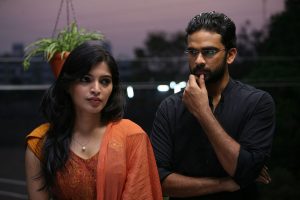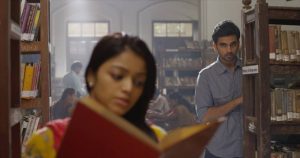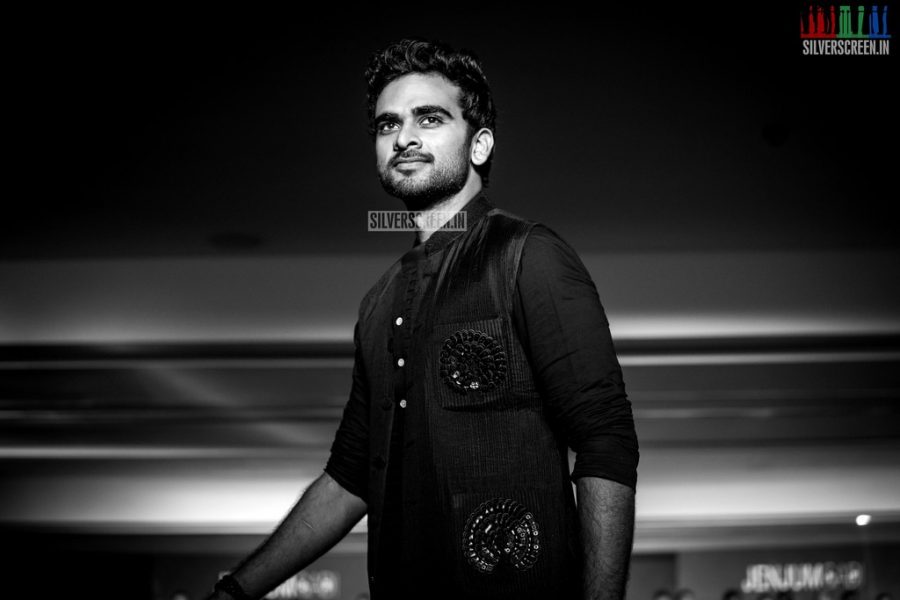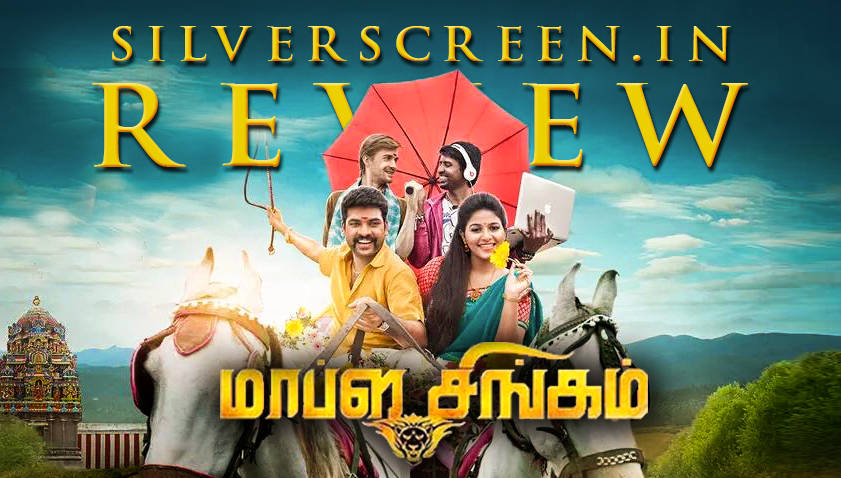With four films behind him, one of the most promising young actors in the industry, Ashok Selvan, opens up to Silverscreen.in about life, career, success and failures. And, of course, his love for cinema.

I meet Ashok Selvan a couple of days after the release of Savaale Samaali, the actor’s most recent film. “Savaale Samaali is doing well, but I expected more. I’m taking it as feedback. So, next time,” he trails off with a smile. Is he disappointed? “We did well, and the script was good. But there’s always an illusion that the film you’re working in is going to be the great film. That landmark commercial success. That life is going to change after the film. Expectations like that helps you go ahead. I too, thought the same way.”
The first thing you notice about Ashok is his friendly smile. There’s something about him that suggests the next-door Chennai boy. Living in a world of cinema, music, and his gang of friends. But what’s really disarming is how unabashedly candid he is about his setbacks.
Some years ago, he says, he waited for a call from a film crew in vain. Even after the film’s release date was announced.
He laughs out loud as he remembers, “I was so naïve.”
Ashok played soft-spoken, sombre-faced characters in two of his four films. His first film, Soodhu Kaavum, was a witty dark comedy about a gang that decides to make a living out of abductions. The second film Pizza II–Villa, was a horror-thriller, and the second instalment of the highly successful Pizza franchise. He played a 30-something writer, sporting a beard and spectacles. The third film, Thegidi, was a game-changer for Ashok, who portrayed a private detective in the mystery thriller. “Only in Savaale Samaali did I get to smile,“ he says
When did you first want to be an actor?
“I’m not someone who dreamed about being an actor from his childhood. I never thought of cinema as anything other than entertainment,” says Ashok. “Like any other youngster, I was just a movie-buff and a good audience. But, when I was in college, a few films like Paruthiveeran, Crash and Brave Heart changed my views. One day I was watching these films, and suddenly, I wanted to be a part of cinema. It hit me that cinema could have a unique impact. Paruthiveeran stayed with me for three weeks.”

And like any aspiring actor, the road ahead was tough for Ashok. He studied visual communication at Loyola College, and the place and the people in it continue to be a part of his life. “In the first few months of college, I realised that I didn’t want to spend my life in front of computers. Around that time, I met some very enthusiastic film-buffs who continue to be my besties.” It was a friend, Ani Sasi, an aspiring actor, who gave him the initial impulse. “One day, we were randomly talking about the fame, the impact of the profession, the creativity involved. And a few days later, at an auditorium in the city, I came across a person named Bharath who asked me if I wanted to audition for a role in the Tamil remake of Happy Days. I was taken aback by the coincidence.” But that wasn’t his big break. The audition was unsuccessful.
During the second year in college, he directed a short film titled Green. “That film made me a lot more serious about becoming a professional. I liked what I was doing, and it is very important to like what you do. I am a person who gets bored of things easily. So I decided to give it a shot, and go ahead with it until I get bored of it. I started acting in plays and short films. I acted in a short film titled Life And Death Of A Rebel, which we shot in Ladakh. I really liked the process.
It was that stage in life, where you don’t worry about the future. You like what you are doing, and you feel you can do it all your life. You don’t need anything out of it, you are purely smitten by the process.
And then life happened – college got over and I was clueless again.”
“I managed to get a portfolio made with the help of a very generous candid wedding photographer, with whom I worked for some time. We would attend weddings, and in between the shots, I would pose for him.” He went from studio to studio asking for a chance. He even shot for a scene in a film. “I spent 4000 bucks, took all my friends to the cinema theatre to watch the film.
We happily sat watching the film, only to discover that my scene was edited out completely from the film. That hurt me. That was the worst Friday in my life, by far.”
He smiles ruefully at the memory.
In Ajith’s Billa, his photograph was used as Ajith’s younger version. Recently, he took on the Billa actor’s dialogue from Arrambam in a dubsmash video, which went viral on social networking sites. “I did that for fun. But the dubsmash videos gave me more popularity than all my films put together.”
https://www.youtube.com/watch?v=_MUI7d451L8
Does he have a favourite genre?
“I like drama, I like thrillers. I would love to play grey-shaded characters. I would love to play a psycho-killer.” He admits that it was tough for him to act in a comedy like Savaale Samaali. “During the initial days of the shoot, I found it hard to get into the character. I had to loosen up a bit for it. I guess I have to do a few more comedy films to feel confident.” He adds, “I am not too fond of horror films. I know how they pull off the spooks. So while working in Pizza, to be honest, I found it little funny.”
Is there is a pressure in the industry for every young actor to do mass-hero roles?
“It depends on your aspirations. If you want people from every section of the audience to like you, then yes. There is such a pressure. If you want everyone to know you, even the audience from other states, yes. But if you’re the kind of a person who wants to just be yourself, and do films that would please just you, I don’t think there is pressure to do mass hero, formulaic roles. But if you want to widen the market, you will need to do crowd-puller roles.
“Many producers ask me to do formulaic films. Thegidi, which was my successful film, did really well in multiplexes and people loved the film when it was telecast on a TV channel. I’ve realised that there are three kinds of audience – A, B, and C. And films are done for each section separately. With Savaale Samaali, we targeted the B and C audience – the kind of people who look at films as entertainment and nothing more. Who go to theatres to relax. Anyway, now I don’t think I want to do films that are made for a particular audience. I will do films that would appeal to people who love cinema.”
Have you charted a career path for yourself?
Yes, I think so. It’s vague, but I am getting to know more about it each day. I don’t think I would do supporting roles anymore, unless it’s a pivotal role. Because it will confuse the market. But as an actor, a pure lover of cinema, I would happily do movies like Soodhu Kaavum again.
I don’t want to be comfortable again. I want to keep challenging myself, as an actor.
One of my forthcoming films is 144. I’m portraying an illegal car racer from Madurai. I had to learn Madurai slang for the role, which was quite challenging. Perhaps because I possess this typical urban look, I’ve been getting a lot of techie roles to play. I turn them down because I’m confident that I can do versatile roles. I’m from Erode and whenever I go there, I feel like any youngster in a small town. In another film, Pirai Thediya Naatkal, I play a person with a disability.” The film, incidentally, is directed by Ashok’s friend Abraham Prabu.
In Koottathil Oruvan, he plays a middle-bencher. “My role in the film doesn’t have any precedent. There are plenty of films about back-benchers and front-benchers. In every group. there’s an ‘invisible’ person, whom you hardly pay attention to. People who aren’t very crowd pleasing and participative.”
His most favourite work so far?
“Recently, I completed director Priyadarshan’s film, in which I play an urban youngster, alongside Prakash Raj. The film isn’t a run-of-mill commercial one. I would say it’s the kind of a film you would love watching and appreciating at film festivals. The experience of working in it was so exhilarating that it’s going to give me a year-long high,” he beams. “I’m going to spend the rest of the year in that bliss. I have become a huge fan of Priyadarshan’s working style. He knows exactly what he wants from people, and how to get it out of them. On the first couple of days at the location, I wasn’t sure what he expected me to do. I guess I had become corrupted by the dramatic industry-style acting, and couldn’t deliver the kind of acting he wanted from me, which was more realistic and subtle. He asked Ani Sasi, who was working as an assistant director, to shoot a video of me when I was off the movie camera, talking to friends. He did that and showed me the video. He said that was the kind of acting Priyan sir wanted from me. That changed the whole thing. From then, every day, I started getting better and better. And he, happier and happier. I don’t think any other director would have done such a thing. A very simple thing that changed the whole thing for an actor.
“I learned and unlearned a lot of things on the sets of this film. Priyadarshan is in total control over the craft.
He knows exactly where to place the camera for a shot. He doesn’t do things like shooting the same shot from different angles and getting it right at the editing table.
Also, the film used sync sound. Initially, I stumbled a bit as I found carrying this microphone on the body all the time a bit irksome.”
You don’t have a godfather or family clout in the industry. Whom do you go to for advice, especially for things like script selection?

janani-iyer-ashok-selvan-still-from-film-thegidi_139158469600
“I don’t have many friends in the industry. I hardly go out and meet people. I don’t go for parties. With other actors, I share a cordial relationship. I used to be a closed person. When I decided that cinema was my career, I changed a lot as a person. I had to open up a lot. As a child and teenager, I hated people asking me questions. But right now I think my approach to the whole thing has changed. I even enjoy the fame and attention I receive now.
Recommended
I’m am confident that ten years from now, I will be around. Happy and content. I want to work in films that make me happy. I want to work in other languages as well. Next year, I will be doing a Telugu film. I want to do a Malayalam film sometime. I even told Sameer Thahir, the director-cameraman I worked with in Priyadarshan’s film, that I want to work in the Malayalam industry sometime.”
And your favourite actors and directors?
“I like Daniel Day Lewis, Russel Crowe, Kamal Haasan. Kamal sir made Mumbai Express, a brilliant dark comedy, years before we made Soodhu Kaavum. I like David Fincher, the master of crime thrillers. Many years from now, he will be known as the one auteur of Hollywood, who understood crime genre like no one else. I love Wong Kar-wai films. Especially In The Mood For Love.
*****
The Ashok Selvan interview is a Silverscreen exclusive.



